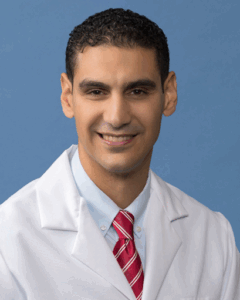
Bassem Shoucri, MD, PhD
I am a fourth-year endocrine fellow at UCLA, where I spend most of my time in a research lab. I grew up in Los Angeles and have done the majority of my training in Southern California. I studied bioengineering at UC San Diego before briefly moving to Washington, DC, to work at the NIH. During a formative year at the NHLBI, I studied microRNA regulation of lipoprotein metabolism. After that, I joined the Medical Scientist Training Program (MD/PhD) at UC Irvine, where my graduate research focused on how endocrine-disrupting chemicals can alter adipose tissue development and function. Presenting that work at Endocrine Society meetings was influential in my decision to pursue clinical training in endocrinology. In 2020, I matched into the Physician Scientist Program at UCLA Pediatrics and later fast-tracked into the endocrinology fellowship, which I have been in since 2022.
My professional interests center on the genetic, environmental, and developmental origins of obesity and the metabolic syndrome. I am particularly interested in how adipose tissue contributes to the development of insulin resistance and type 2 diabetes. My current projects focus on characterizing type 2 diabetes risk variants that limit energy storage in healthy subcutaneous fat depots, with the hope of identifying new pathways that regulate adipose insulin sensitivity.
I actually chose my subspecialty before I had even decided on my specialty. My PhD research pushed me toward endocrinology, but I ultimately chose pediatrics because of my interest in the developmental origins of disease, my desire to focus on prevention in addition to treatment, and the fact that being around kids helps keep adults from taking themselves too seriously.
Along the way, I have had mentors who left a lasting impact on me. One of the most influential was Dr. Wadie Najm, my clinical skills instructor at UC Irvine, who sadly passed away while I was in graduate school. He was a master clinician and patient teacher, and he often reminded us that the hardest skill for a doctor to learn is to listen. I think of him often when I am seeing patients.
One of the most challenging but formative experiences in my journey was returning to third-year medical school after finishing my PhD. It was a dramatic shift—from complete autonomy in the lab to the rigid demands of the wards—made even more difficult by the fact that I had an 18-month-old at home. Looking back, though, I realize how valuable that year was. Many skills from the lab translated well to clinical medicine, such as working effectively in teams with different personalities and understanding a supervisor’s perspective. To this day, when I’m facing a challenge, I remind myself, “It can’t be harder than going back to third year!”
